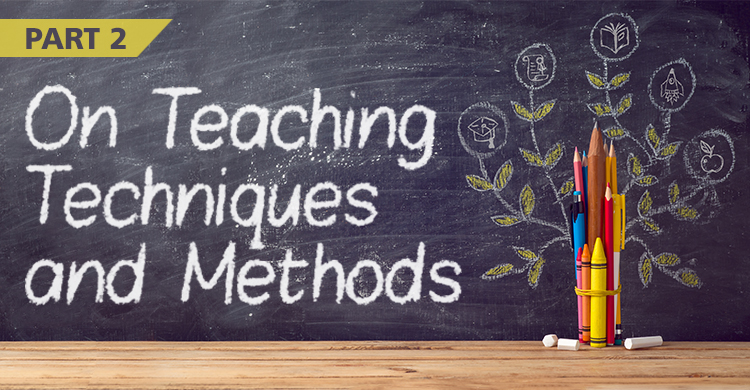On Teaching Techniques and Methods: Reflections of an Experienced Teacher (Part Two)
By Ralph Rhodes, retired social studies teacher, Council Rock High School, Pennsylvania
Edited by Elliott Seif, author of Teaching for Lifelong Learning: How to Prepare Students for a Changing World
Editor’s note: Many years ago, I worked with Ralph Rhodes who, upon his retirement from education, wrote this paper with the intention of passing on some of his teaching insights to others. His words of wisdom are divided into two separate blogs—the first one on teaching techniques and methods and this blog, part two, on “who you are” as an educator.
I have edited his work to make it more general and fit with today’s times, but there is a lot of wisdom about teaching at any level presented here. Enjoy!
My fellow educators:
Over the last 22 years, I have consistently evaluated my own teaching. For 10 of those years, I have had my students do the same. I have divided my reflections into two parts: the first 10 suggestions, posted in an earlier blog on teaching techniques and strategies, and these 10 suggestions on “being” or the importance of who a teacher is in the classroom.
Several of these tips can also be helpful to educational leaders who may want to share and discuss these ideas with teachers. Since we are all unique and many effective teaching styles can be very different from one another, some of the items listed here may or may not be appropriate for everyone. However, I hope these 10 ideas on “being” are ultimately helpful to many of those in the classroom as well as those working with teachers.
- Be inspired. If you ever wish to inspire others, you must be inspired yourself. Seek and cultivate your own sources of inspiration. Find others who have the same passions as you do and encourage each other.
A good teacher has a thirst for learning as well as teaching. Be a thief of other ideas, techniques, and attitudes that inspire you as a teacher. Take courses that renew your creativity. Become friendly with those who set high ideals and stoke your personal and professional passions.
It also helps to have childlike curiosity and excitement. Tom Hanks was told in the movie Joe Versus the Volcano that only a few people on Earth are awake; the rest are going through life asleep, unaware, unappreciative, and unexcited. Make sure you and your classes are among those that are awake. You and your students will benefit from such inspiration and passion. - Make sure you have the energy you need for the magic moments when you are with your students. Good teaching requires high levels of energy and enthusiasm. Each day, you must be fresh and up and ready to wage war against ignorance. Though your role should be closer to a “guide on the side” than a “sage on the stage,” steering your students toward inquiry, understanding, and explanation is the greatest show on Earth. Do whatever it takes to stay fresh and enthusiastic.
- Be supportive and empowering, not negative and controlling. Your job is to get your students to feel good about what they do and to empower them to learn, apply what they learn, and think on their own. Someone once said that humility is having the ability and capacity to see all people as equals, so approach your students with this humility. Create a dialogue. Let them talk and always try to find value and interest in what they say. Respect their opinion, and they will respect yours and will be empowered to think more on their own.
- Set high standards for yourself and your students, and always be a truth seeker. Good teaching is hard work and requires a lot of effort and thoughtfulness inside and outside of the classroom. Always challenge your class with the appropriate level of work, but monitor this carefully for each student. Use the same grading standards for all, but in your feedback, be encouraging to those less skilled and challenge those with more confidence and mastery. Also, contact home with positive thoughts when a student does something outstanding or when his or her confidence needs a boost.
You should always strive for the truth. Present yourself as someone who facilitates truth seeking. This may require admitting you are wrong or that you do not know but will find out—or you’ll help your students find out. To seek the truth is a habit and a way of being that you can model for your students. - Be very clear on what you expect in every assignment. Important, complex, and involved assignments should be modeled as concretely as possible. Share previously completed exemplary projects and assignments with your students. Term papers and other involved projects should be completed in steps so students get feedback as they progress. When possible, give students a chance to revise their work so they (and you) can be proud of what they achieved.
- Never lose the opportunity to be dramatic. If you have an inclination or flair for dramatic teaching techniques, such as those exhibited by Robin Williams in the movie Dead Poets Society, use them: stand on your desk, give a press conference as Teddy Roosevelt, have your class do the wave, draw cartoons on the board. Lose your inhibitions. It may be best to limit these at the beginning of the year, but once the ice is broken, go for it. As Miss Frizzle of The Magic School Bus says, “Don’t be afraid to make mistakes, get messy, ask questions, get answers.”
- Be clear on goals for the year, unit, and day. It’s good to be spontaneous but be clear what it is you want your students to learn, understand, or demonstrate. I always had a daily agenda with my lesson goals on the board, and at the end of the period, I used it for closure.
- Be a moral agent. Many educators feel uncomfortable imparting values and morals in teaching, but I feel strongly that teachers must be moral agents. They must be strong moral examples and expect the same behaviors from their students. The principles of human dignity, justice, and equality are standards to exemplify and reinforce. Teachers should not belittle anyone, and students shouldn’t either. A racist, a thief, a liar, or a bully in the classroom should not be tolerated but should be handled without sacrificing that person’s dignity.
- Be centered and focus on the positive aspects of teaching students. For those of us who are intensely self-critical, teaching can be a daily roller coaster of emotional bliss and great despair—especially when things go wrong. Although a lesson’s failure is often an opportunity to learn, one must realize that teaching success or failure can be dictated by factors beyond a teacher’s control, such as the time of day, the mood and attitude of students, or students’ familial or social troubles. Teachers must be centered and confident and know that all they can do is their best—and then let the chips fall where they may.
It’s important to keep some inner peace and a sense of humor as a teacher and not have your mood be dependent on whether you were successful or not that day. I used to have a sign in my room that said, “Every day in here is a battle against ignorance. Who won today?” It helped me get through those occasional bad days when ignorance won more often than I would have liked.
Effective teaching depends on consistent monitoring of student learning, but as a teacher, you should always do this with kindness and forgiveness. Do whatever you can to be centered and not overreact to the outcome of one or two classes, the challenges of student learning, or the behavior of one or two students. Things are often not as bad as you think—and even if they are bad, you should remember that you can lose some battles and still win the war. In short, be gracious and kind to yourself as well as your students.
Keep these lessons in mind:- Often your worst class will end up being one of your best classes by the end of the year. (Unfortunately, the reverse is also true.)
- A few students can ruin a class if you let them. In a class where one or more students turn things sour, don’t let it ruin your feelings for the entire class. When a class has you down, focus and reinforce what is good about that class. Take time to get to know the quiet and more productive students and offer your best to them. You still need to address the challenging students as best you can, but don’t let that ruin your effort to teach the others.
In the worst case scenarios, I just accepted the fact that I could not change a student or a group of students. I just went with them and never threw in the towel. Like in a marriage, you need to accept the unpleasant things in your relationship and focus on and nurture the good things.
- Be persistent in your own desire to grow and learn. Teaching is both a science and an art form that can always be improved. The day teachers feel they know it all is the day they’ll lose the excitement and curiosity of teaching. Cultivate the habit of always looking for new resources, new methods, new ideas, and better ways of being and doing. Keep a professional list of things you want to remember to do and change, and keep working on these items a little at a time.
These 10 items are just some humble suggestions on “being” as a classroom teacher. I hope some of them are helpful to you. Teaching is a wonderful and rewarding profession. Be patient and kind to yourself, and remember that good teaching takes lots of time and effort.
Make sure you and your classes are among those awake.






